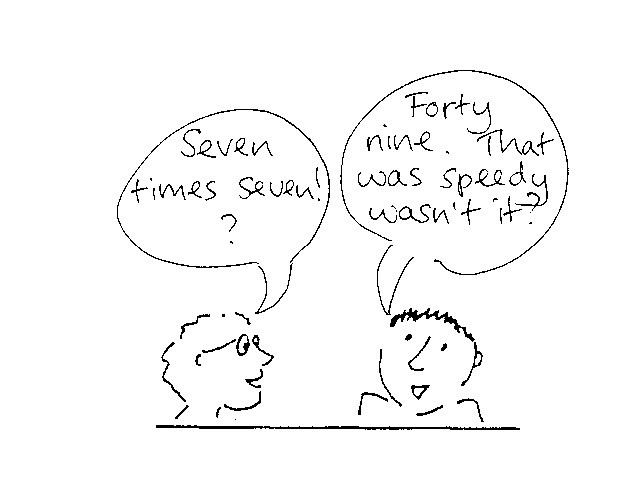
Speaky Maths Activities
To "celebrate" the arrival of the new primary framework and the EAL toolkit, here are some activities where the finest honed EAL tools have been employed to encourage speaking and listening while raising maths standards. Please try them out. Please adapt them to your children. Please send us any activities which you would like to share or if you put them online tell us and we'll put in a link from this site. Please check this page regularly since we are going to be running some development workshops for maths and will be posting resources here.
:
Our new game for speeding up tables recall. This activity (for Year 3 up to Year 9 and beyond) is a slightly competitive way to encourage children to arrive at instant recall. When game is won by the Player Two each time, then you know you have succeeded, and can go on to more sophisticated investigations. This activity has built in assessment for learning!
Here is a mental maths game which uses connect four to encourage children to improve their speed in adding. And
Track Game on Capacity. This is a track game to encourage (in this case Year 3 children) to ask each other questions about "How many Millilitres in???".
Function Bingo. The functions are on the bingo cards, and children generate numbers to create sums that 'use up' their functions. This will work with Year 3, but with the addition of multiplication and division can be used with more experienced children.
An activity added to encourage healthy guessing and improving place value in dividing big numbers: http://www.collaborativelearning.org/estimatingdivision.pdf.
The multiplication guessing game has proved very successful with Year 5 up: http://www.collaborativelearning.org/estimatingmultiplication.pdf
Connect Four game on multiples. The board contains numbers and the cards: "is a multiple of.....".
A new activity on doubling for Year 3 and up http://www.collaborativelearning.org/doubling.pdf
An activity comparing number size for 6 year olds up http://www.collaborativelearning.org/moreorless.pdf
An activity to help children sort out the words in wordy problems from the real maths hidden away underneath: http://www.collaborativelearning.org/whichfunction.pdf This has worked extremely well to build the confidence of children often deterred by the linguistic and cultural obfustication of some written tests. We'd really welcome more activities like this!
and an activity to encourage children to put themselves into QCA hats and write their own wordy questions (we'll post this in literacy too!) http://www.collaborativelearning.org/wordymaths.pdf
A Follow Me activity to practise mental maths (set for 9-12 year olds, but adaptable to other ages and stages.
A what am I game on the properties of 2D shapes for 8-10 year olds.
A snakes and ladders game full of interesting information about numbers and setting some problems too. Designed for 9- ? year olds.
Two games to practise knowledge of fractions http://www.collaborativelearning.org/fractionfrolics.pdf
A way of working in groups to add big numbers. Designed for 8-9 year olds.
An activity to help students reflect on how they added big numbers. Designed for 8-9 year olds.
A history and maths activity: http://www.collaborativelearning.org/historymaths1.pdf
The materials from the workshops we ran in Bedfordshire and Nottingham can be found at http://www.collaborativelearning.org/talkingmaths.pdf
Farewell to SMILE! The project worked over a long period with SMILE Mathematics, Although they originally were a secondary project, they developed materials and software for KS2. They also had a large selection of collaborative learning activities in their catalogue:
Multiplication games: three games to reinforce and consolidate multiplication facts. NC levels 2-5.
Fractions galore: fractions, decimals and percentages. NC levels 5-6.
Problem solving activities: involving algebra, ratio and averages. NC levels 6-8.
Graphs: Dipsticks, Graph matching, Matching Graphs and Simultaneous Equations from Graphs to help make connections between graphs and scales, NC levels 6-8
Problem solving posters: suitable for Gifted and Talented students. NC levels 4-8.
Conversions: Centigrade to Fahrenheit, metric and imperial. NC levels 5-7.
Materials to Teach Time: Time Tiles and 24 Hour Bingo.
Number, place value and multiples activities in Bengali, Chinese,Urdu, Hindi and Panjabi. NC levels 5-7.
They also have some excellent computer actitives on CD rom and have recently provided investigations online.
Alas they have had to close down, but the materials as long as they last, are still available and you will find a link to Bournemouth Book Services who are selling them on the SMILE website.
Another ex ILEA maths project run by Sheila Ebbutt is BEAM http://www.beam.co.uk They aim to make teaching maths interesting, challenging and enjoyable. They have branched into KS3 and produce a variety of games at all key stages. They also sell maths activities from other projects and local authorities.
October 2009 The activities are currently being revised and moved to
Return to summary of all activities.